I have wanted to paint the all the Major Players of the Napoleonic Wars for some years now and I finally I am in a position to start. I shall be painting the Iconic figures of the period Napoleon, Wellington and the other heads of state (Wellington was not a head of state I know) including Marshals and Generals from all sides of the conflict. If you would like to see a particular military personality on here please let me know.
General Emmanuel Grouchy 1766-1847
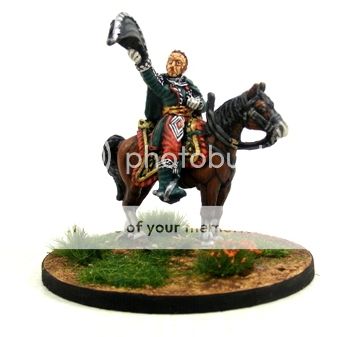 Grouchy, Emmanuel. A French general who, entering the army at fourteen, took part in the Vendean campaign,"and was appointed second in command to Hoche in the Irish expedition. He saw much service in Italy, and fought in most of the battles of the German campaign, one of his chief feats being the covering of the retreat at the battle of Leipzig. He joined Napoleon after the latter's escape from Elba, and defeated Bleicher at Ligny. After Waterloo - which some of his enemies declared to have been lost through his mistake - he conducted the army back to Paris, and then went to America till 1819. In 1831 he returned to France, and was reinstated in his military rank.
Grouchy, Emmanuel. A French general who, entering the army at fourteen, took part in the Vendean campaign,"and was appointed second in command to Hoche in the Irish expedition. He saw much service in Italy, and fought in most of the battles of the German campaign, one of his chief feats being the covering of the retreat at the battle of Leipzig. He joined Napoleon after the latter's escape from Elba, and defeated Bleicher at Ligny. After Waterloo - which some of his enemies declared to have been lost through his mistake - he conducted the army back to Paris, and then went to America till 1819. In 1831 he returned to France, and was reinstated in his military rank.
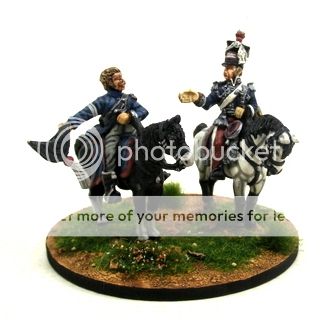 Polish General Dabrowski founder of the Polish Legions served in the Saxon Army from 1770 to 1792 and in the Polish Army from 1792. He took part in the Polish Uprising of 1794, distinguished himself during the defence of Warsaw, and showed himself a skilful commander in the campaign against the Prussian troops in Great Poland. After the third partition of Poland, he emigrated to France, whose aid
Polish General Dabrowski founder of the Polish Legions served in the Saxon Army from 1770 to 1792 and in the Polish Army from 1792. He took part in the Polish Uprising of 1794, distinguished himself during the defence of Warsaw, and showed himself a skilful commander in the campaign against the Prussian troops in Great Poland. After the third partition of Poland, he emigrated to France, whose aid
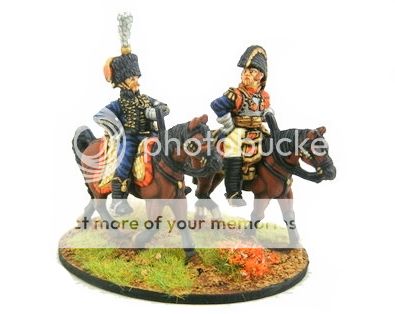 Another fine commander and a heavy cavalry specialist, mainly cuirassiers. He came from a very old noble family, which had a tradition of serving France stretching back hundreds of years. Talented and charismatic, a giant of a man, with enormous upper body strength, and who used his physical presence to great effect. A veteran soldier when compared with many of the Emperor's senior commanders.
Another fine commander and a heavy cavalry specialist, mainly cuirassiers. He came from a very old noble family, which had a tradition of serving France stretching back hundreds of years. Talented and charismatic, a giant of a man, with enormous upper body strength, and who used his physical presence to great effect. A veteran soldier when compared with many of the Emperor's senior commanders.
Present on the fields of Maubeuge, Fleurus, Blankenberg, Altenkirchen, Neuwied, Ostrach, Stockach, Engen, Biberach, and Hohenlinden. He had an awesome reputation even before Napoleon came on the scene.
He was at Austerlitz, where he led the charge against the Russian centre on the Pratzen Heights with his 2nd Heavy Cavalry Division comprising the 1er, 5e, 10e and 11e Cuirassier Regiments with his brigade commander, the 44 year old General Raymond-Gaspard de Bonardi Saint Sulpice.
Then at Jena on 14 October 1806, where d'Hautpoul retained divisional command, the 1er and 5e Cuirassiers were under Brigade commander General Jean-Christophe Collin Verdiere of which only the four squadrons of the 1er Cuirassiers were engaged, while Saint-Sulpice retained command of the 2e brigade. Four days later, on 18 October, at Schwarzbourg in Germany, Verdiere suddenly died aged 52.
At Eylau on 7 February 1807, d'Hautpoul led his division in action against the Russians, his squadrons together with those of Colonel Lepic of the Grenadiers-a-Cheval having penetrated to the third line of the enemy, and causing many casualties. d'Hautpoul was struck by a canon ball, which shattered his hip. The renowned surgeon, Dominique Larrey, on viewing d'Hautpoul's terrible wounds recommended amputation of his leg as his only chance of survival, but encouraged by Pierre-Francois Percy, the stricken cavalry commander unwisely ignored this advice. He was taken wrapped in his bloodstained cloak to the nearby village of Vornen where he died the following day. He was 51 years of age.
According to Meneval's Memoirs, Volume 2, d'Hautpoul in spite of his wounds, wrote to Napoleon expressing his everlasting devotion. The Emperor for his part, replied stating that he was sure d'Hautpoul would survive to lead his squadrons in further victorious actions.
The gallant cavalryman's command was taken over by his long time friend and colleague General Saint-Sulpice.
d'Hautpoul was a very talented soldier and one of the great commanders of his time. His loss was a great blow to Napoleon, however, the giant cuirassier probably died as he would have wished, leading his men in action across the snowy wastes of Eylau.
General Pierre David de Colbert-Chabanais1774-1853
 Born into a noble family descended from the prestigious Colbert line, he was the son of the comte de Colbert, a rich landowner. On 23 August 1793, Pierre followed the traditional family route into the army, which was now the Republican army, although he was suspicious of the French Revolution. He fought in the 1793 campaigns in the armée du Rhin, as a member of the bataillon de Paris, also known as the bataillon Guillaume-Tell after William Tell. He moved to the 11th Hussar Regiment, gaining promotion to maréchal-des-logis in September 1793 and to sous-lieutenant the following month.
Born into a noble family descended from the prestigious Colbert line, he was the son of the comte de Colbert, a rich landowner. On 23 August 1793, Pierre followed the traditional family route into the army, which was now the Republican army, although he was suspicious of the French Revolution. He fought in the 1793 campaigns in the armée du Rhin, as a member of the bataillon de Paris, also known as the bataillon Guillaume-Tell after William Tell. He moved to the 11th Hussar Regiment, gaining promotion to maréchal-des-logis in September 1793 and to sous-lieutenant the following month.
After three years in the armée du Rhin and in the armies suppressing the Vendean Revolt, he was dismissed by Lazare Hoche in 1796. He left the 7th Hussars to become a commissaire des guerres to the armée d'Orient, with the job of guaranteeing Bonaparte's supply lines to Egypt. During that time Bonaparte took him under his wing.
Returning to the army after Egypt, he was wounded and made a captain in the 3rd Dragoon Regiment, before finally rising to become aide de camp to Damas. He then became adjudant-major to the Mameluks and aide de camp to Junot in 1803. He then followed Junot to become part of the armée des côtes.
Colbert left Junot in 1805 and followed major général Maréchal Berthier as his aide de camp. He assisted at Austerlitz, where he was wounded and made a chef d'escadron. He fought bravely at Iena and Pułtusk. In 1807 he was made a colonel and head of his old regiment, the 7th Hussars. This unit was now part of Lassalle's brigade, nicknamed the "infernal" brigade due to its passion. Napoleon made him a knight of the Légion d'honneur in 1808 and baron de Chabanais et de l'Empire in 1809
Colbert was promoted to général de brigade on 9 March 1809 and put under the orders of Oudinot. He won glory at the Battle of Raab by charging and defeating Ott's hussars, cutting several squadrons of the enemy Hungarian cavalry to pieces and nearly coming to the aid of the 9th Hussar Regiment, which the Austrians were on the point of overwhelming. At Wagram Colbert was shot in the head three times and was made a commander of the Légion d'honneur.
Attached to the Imperial Guard in 1811, he re-formed and commanded the 2e régiment de chevau-légers lanciers de la Garde impériale (better known as the Red Lancers, they were also nicknamed the écrevisses or crayfish, after their red uniforms). He also led the brigade for the whole of the Russian campaign under the orders of the duc d'Istrie. He and the Lancers then bravely covered the Grande Armée's retreat. He was made a général de brigade in 1813 during the retreat back through Germany and at Bautzen he broke and routed the Russians and cut them to pieces. On 25 November 1813 he was promoted to général de division.
General Friedrich Wilhelm von Bülow 1755-1816
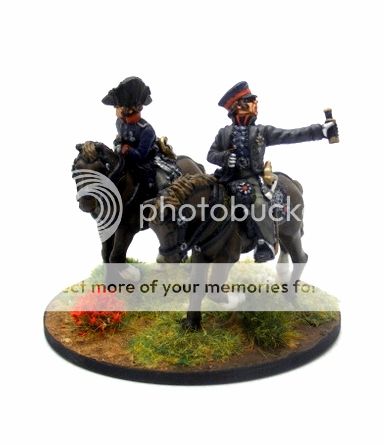 Bülow was born in Falkenberg (Wische) in the Altmark and was the elder brother of Freiherr Dietrich Heinrich von Bülow. He received an excellent education, and entered the Prussian army in 1768, becoming ensign in 1772, and second lieutenant in 1775. He took part in the Potato War of 1778, and subsequently devoted himself to the study of his profession and of the sciences and arts.
Bülow was born in Falkenberg (Wische) in the Altmark and was the elder brother of Freiherr Dietrich Heinrich von Bülow. He received an excellent education, and entered the Prussian army in 1768, becoming ensign in 1772, and second lieutenant in 1775. He took part in the Potato War of 1778, and subsequently devoted himself to the study of his profession and of the sciences and arts.
General Emmanuel Grouchy 1766-1847
 Grouchy, Emmanuel. A French general who, entering the army at fourteen, took part in the Vendean campaign,"and was appointed second in command to Hoche in the Irish expedition. He saw much service in Italy, and fought in most of the battles of the German campaign, one of his chief feats being the covering of the retreat at the battle of Leipzig. He joined Napoleon after the latter's escape from Elba, and defeated Bleicher at Ligny. After Waterloo - which some of his enemies declared to have been lost through his mistake - he conducted the army back to Paris, and then went to America till 1819. In 1831 he returned to France, and was reinstated in his military rank.
Grouchy, Emmanuel. A French general who, entering the army at fourteen, took part in the Vendean campaign,"and was appointed second in command to Hoche in the Irish expedition. He saw much service in Italy, and fought in most of the battles of the German campaign, one of his chief feats being the covering of the retreat at the battle of Leipzig. He joined Napoleon after the latter's escape from Elba, and defeated Bleicher at Ligny. After Waterloo - which some of his enemies declared to have been lost through his mistake - he conducted the army back to Paris, and then went to America till 1819. In 1831 he returned to France, and was reinstated in his military rank.
Archduke Charles of Austria 1771 –1847
Charles was an Austrian field-marshal, the third son of emperor Leopold II and his wife Maria Luisa of Spain. He was also the younger brother of Francis II, Holy Roman Emperor. Despite being epileptic, Charles achieved respect both as a commander and as a reformer of the Austrian army. He was considered one of Napoleon's most formidable opponents.
He began his career fighting the revolutionary armies of France. Early in the wars of the First Coalition, he saw victory at Neerwinden in 1793, before tasting defeat at Wattignies 1793 and Fleurus 1794. In 1796, as chief of all Austrian forces on the Rhine, Charles out-generaled Jean-Baptiste Jourdan at Amberg and Würzburg, and forced Jean Victor Marie Moreau to withdraw across the Rhine, and followed these victories with others at Zürich, Ostrach, Stockach, and Messkirch in 1799. He reformed Austria's armies to adopt the nation at arms principle; in 1809, he went into the War of the Fifth Coalition with confidence and inflicted Napoleon's first major setback at Aspern-Essling, before suffering a defeat at the bloody Battle of Wagram. Following Wagram, Charles saw no more significant action in the Napoleonic Wars.
As a military strategist, historians compare him to Arthur Wellesley, 1st Duke of Wellington, conservative, cautious, and competent. Charles was a study in contrasts. As a practitioner, he was flawless in executing complex and risky manoeuvre's of troops in the heat of battle, achieving brilliant victories in the face of almost certain defeat. Yet, as a theoretician, his devotion to ground and caution led his contemporary, Carl von Clausewitz, to criticize his rigidity and adherence to geographic strategy. Regardless, he remains among Austria's pantheon of heroes of the French Revolutionary and Napoleonic wars.
General Dąbrowski Jan 1755-1818
 Polish General Dabrowski founder of the Polish Legions served in the Saxon Army from 1770 to 1792 and in the Polish Army from 1792. He took part in the Polish Uprising of 1794, distinguished himself during the defence of Warsaw, and showed himself a skilful commander in the campaign against the Prussian troops in Great Poland. After the third partition of Poland, he emigrated to France, whose aid
Polish General Dabrowski founder of the Polish Legions served in the Saxon Army from 1770 to 1792 and in the Polish Army from 1792. He took part in the Polish Uprising of 1794, distinguished himself during the defence of Warsaw, and showed himself a skilful commander in the campaign against the Prussian troops in Great Poland. After the third partition of Poland, he emigrated to France, whose aid
he tried to enlist for the restoration of Polish independence.In 1797 Dabrowski formed the Polish Legions in Italy; he commanded them in France’s war in Italy against the coalition of European powers.He led an uprising in the western provinces of Poland in 1806 and distinguished himself in the capture of Danzig and at Friedland. In 1812, Dabrowski commanded a Polish division in Napoleon’s campaign in Russia, fought near Bobruisk, and covered the retreat of Napoleon’s army at Berezina. After fighting in the campaign in Germany in 1813, he returned to Poland in 1814. When the Polish Kingdom was formed as part of Russia in 1815, Dabrowski became a member of the Polish Military Committee, participated in reorganizing the Polish Army, and was made general of cavalry in 1815. He retired in 1816. Dabrowski was noted for his great bravery and his talent for organization, and he was popular among his troops.
General Carra Saint-Cyr 1760-1834
French general and diplomat, noted for his participation to the French Revolutionary and Napoleonic Wars.Carra Saint-Cyr entered active service in 1774, with the Bourdonnais regiment, and was a part of the French expeditionary corps during the American War of Independence. He was a captain and held a position in the military commissariat. With the outbreak of the Wars of the Revolution, Carra Saint-Cyr resumed active duty, serving in the army of the West as aide-de-camp to general Jean-Baptiste Annibal Aubert du Bayet, subsequently accompanying Aubert du Bayet to Constantinopole, where the latter was appointed ambassador to the Ottoman Empire. Carra Saint-Cyr then served as consul in Wallachia, before returning to France, in 1798. He was at Marengo in 1800 and became a general of division in 1803. Named governor of Magdeburg in 1806, he was created baron of the Empire two years later and in 1809 he held the command of an infantry division during the War of the Fifth Coalition, playing an important role at the battle of Aspern-Essling. He was named governor of Dresden and in 1813 governor of Hamburg and in this capacity evacuated the city with his troops and was defeated on the Elba. For this, he was disgraced, but general Dominique Vandamme still gave him the command of a division, with the mission of defending the Ems river. With the Bourbon Restoration of 1814, Carra Saint-Cyr was created count and named governor of the French Guiana, a position that he would hold from 1814 to 1819. His name appears on the Arc de Triomphe in Paris.
French general and diplomat, noted for his participation to the French Revolutionary and Napoleonic Wars.Carra Saint-Cyr entered active service in 1774, with the Bourdonnais regiment, and was a part of the French expeditionary corps during the American War of Independence. He was a captain and held a position in the military commissariat. With the outbreak of the Wars of the Revolution, Carra Saint-Cyr resumed active duty, serving in the army of the West as aide-de-camp to general Jean-Baptiste Annibal Aubert du Bayet, subsequently accompanying Aubert du Bayet to Constantinopole, where the latter was appointed ambassador to the Ottoman Empire. Carra Saint-Cyr then served as consul in Wallachia, before returning to France, in 1798. He was at Marengo in 1800 and became a general of division in 1803. Named governor of Magdeburg in 1806, he was created baron of the Empire two years later and in 1809 he held the command of an infantry division during the War of the Fifth Coalition, playing an important role at the battle of Aspern-Essling. He was named governor of Dresden and in 1813 governor of Hamburg and in this capacity evacuated the city with his troops and was defeated on the Elba. For this, he was disgraced, but general Dominique Vandamme still gave him the command of a division, with the mission of defending the Ems river. With the Bourbon Restoration of 1814, Carra Saint-Cyr was created count and named governor of the French Guiana, a position that he would hold from 1814 to 1819. His name appears on the Arc de Triomphe in Paris.
Marshal Karl Philipp von Wrede 1767-1838
Bavarian field-marshal He was educated for the career of a civil official under the Electorate of the Palatinate government, but on the outbreak of the campaign of 1799 he raised a volunteer corps in the Palatinate and was made its colonel. This corps excited the mirth of the well-drilled Austrians with whom it served, but its colonel soon brought it into a good condition, and it distinguished itself during Kray's retreat on Ulm. At the Battle of Hohenlinden (1800) Wrede commanded one of the Palatinate infantry brigades with credit, and after the peace of Lunéville he was made lieutenant-general in the Bavarian army, which was entering upon a period of reforms. Wrede soon made himself very popular, and distinguished himself in opposing the Austrian invasions of 1805.
In the War of the Fifth Coalition, he led the 2nd Bavarian Division in the VII Corps.He played an important part in the Battle of Abensberg on 20 April 1809. In the morning, he probed Joseph Radetzky's Austrian defense at Siegenburg. Unable to make headway, he marched his division north to Biburg and crossed the Abens River. From Biburg, he moved on Kirchdorf and attacked Frederick Bianchi's reinforced brigade.When the Austrians retreated, Wrede aggressively pursued them to Pfeffenhausen late that evening.He led the advance from Pfeffenhausen and was involved in the Battle of Landshut on 21 April, capturing 11 cannon. On 24 April, his division was defeated at the Battle of Neumarkt-Sankt Veit when Johann von Hiller counterattacked in superior force. After occupying Salzburg on 29 April, Wrede moved southwest against the Tyrolean Rebellion. He pushed back Tyrolean irregulars at Lofer on 11 May and defeated Franz Fenner's mixed regulars and Tyroleans at Waidring the next day. On 13 May, he played a major part in crushing the division of Johann Gabriel Chasteler de Courcelles in the Battle of Wörgl.
After the French defeat at the Battle of Aspern-Essling, Napoleon of France called Wrede's division to Vienna as a reinforcement. At first, Wrede's division stood in reserve in the Battle of Wagram. In the afternoon of 6 July, the Bavarians were sent into battle in support of Jacques MacDonald's celebrated attack. In a successful charge on the village of Sussenbrunn, Wrede was grazed by a bullet. Fearing the wound was fatal, he told MacDonald, "Tell the Emperor I die for him. I recommend to him my wife and children." Seeing that Wrede's injury was minor, the French general smiled and replied, "I think that you will be able to make this recommendation to him yourself." The embarrassed general got up and continued to lead his troops.
The Bavarians were for several years the active allies of Napoleon, and Wrede led the Bavarian corps that fought in Russia in 1812. Just before the Battle of Leipzig in October 1813, he negotiated the Treaty of Ried between Austria and Bavaria, by which Bavaria switched sides. Wrede then fought with the allies against Napoleon. After Leipzig, he tried to block the French escape at the Battle of Hanau on 30 and 31 October. Wrede positioned his troops poorly and Napoleon smashed one of his wings, inflicting 9,000 casualties. In 1814 he was created prince and field marshal. Wrede represented Bavaria at the Congress of Vienna.
He married on 18 March 1795 Sofie, Gräfin von Wiser, by whom he had eight children. He died in Ellingen. Von Wrede was no doubt the leading Bavarian soldier of his day.
Bavarian field-marshal He was educated for the career of a civil official under the Electorate of the Palatinate government, but on the outbreak of the campaign of 1799 he raised a volunteer corps in the Palatinate and was made its colonel. This corps excited the mirth of the well-drilled Austrians with whom it served, but its colonel soon brought it into a good condition, and it distinguished itself during Kray's retreat on Ulm. At the Battle of Hohenlinden (1800) Wrede commanded one of the Palatinate infantry brigades with credit, and after the peace of Lunéville he was made lieutenant-general in the Bavarian army, which was entering upon a period of reforms. Wrede soon made himself very popular, and distinguished himself in opposing the Austrian invasions of 1805.
In the War of the Fifth Coalition, he led the 2nd Bavarian Division in the VII Corps.He played an important part in the Battle of Abensberg on 20 April 1809. In the morning, he probed Joseph Radetzky's Austrian defense at Siegenburg. Unable to make headway, he marched his division north to Biburg and crossed the Abens River. From Biburg, he moved on Kirchdorf and attacked Frederick Bianchi's reinforced brigade.When the Austrians retreated, Wrede aggressively pursued them to Pfeffenhausen late that evening.He led the advance from Pfeffenhausen and was involved in the Battle of Landshut on 21 April, capturing 11 cannon. On 24 April, his division was defeated at the Battle of Neumarkt-Sankt Veit when Johann von Hiller counterattacked in superior force. After occupying Salzburg on 29 April, Wrede moved southwest against the Tyrolean Rebellion. He pushed back Tyrolean irregulars at Lofer on 11 May and defeated Franz Fenner's mixed regulars and Tyroleans at Waidring the next day. On 13 May, he played a major part in crushing the division of Johann Gabriel Chasteler de Courcelles in the Battle of Wörgl.
After the French defeat at the Battle of Aspern-Essling, Napoleon of France called Wrede's division to Vienna as a reinforcement. At first, Wrede's division stood in reserve in the Battle of Wagram. In the afternoon of 6 July, the Bavarians were sent into battle in support of Jacques MacDonald's celebrated attack. In a successful charge on the village of Sussenbrunn, Wrede was grazed by a bullet. Fearing the wound was fatal, he told MacDonald, "Tell the Emperor I die for him. I recommend to him my wife and children." Seeing that Wrede's injury was minor, the French general smiled and replied, "I think that you will be able to make this recommendation to him yourself." The embarrassed general got up and continued to lead his troops.
The Bavarians were for several years the active allies of Napoleon, and Wrede led the Bavarian corps that fought in Russia in 1812. Just before the Battle of Leipzig in October 1813, he negotiated the Treaty of Ried between Austria and Bavaria, by which Bavaria switched sides. Wrede then fought with the allies against Napoleon. After Leipzig, he tried to block the French escape at the Battle of Hanau on 30 and 31 October. Wrede positioned his troops poorly and Napoleon smashed one of his wings, inflicting 9,000 casualties. In 1814 he was created prince and field marshal. Wrede represented Bavaria at the Congress of Vienna.
He married on 18 March 1795 Sofie, Gräfin von Wiser, by whom he had eight children. He died in Ellingen. Von Wrede was no doubt the leading Bavarian soldier of his day.
General Sir William Beresford 1768-1854
 Joining the army in 1785, the aristocratic Beresford served in North America and lost an eye in a hunting accident in 1786.
Joining the army in 1785, the aristocratic Beresford served in North America and lost an eye in a hunting accident in 1786.
 Joining the army in 1785, the aristocratic Beresford served in North America and lost an eye in a hunting accident in 1786.
Joining the army in 1785, the aristocratic Beresford served in North America and lost an eye in a hunting accident in 1786.
He fought the French at Toulon and, in 1795, joined the 88th when it went to India.
Beresford saw more service in Egypt, the Cape and then came the embarrassment of being captured at Buenos Aires.
After a brief time as Governor of Madeira (for Portugal), Beresford returned to the British army with Sir John Moore and the Duke of Wellington.
In 1809, he was promoted and given the task of turning the Portuguese army into an efficient and disciplined fighting force.
Knighted after the battle of Bussaco, Beresford then commanded at the bloody conflict of Albuera, where he received criticism for his positioning of troops.
Supported by Wellington, Beresford threw off self-doubt and continued to play a major role in the campaign. A man of immense personal strength - he once threw a French cavalryman from his saddle - he was severely wounded at Salamanca.
After the war he became Master-General of the Ordnance between 1828 and 1830. Whatever doubts others may have had about Beresford's capacity for independent command they were never backed by Wellington. He said if anything ever happened to him then it was Beresford he wanted to take over.
General Sir Rowland Hill 1772-1842
Without doubt the most popular of Wellington's Generals among both officers and enlisted men, Rowland Hill was born on the 11th August 1772, the second son of a Shropshire gentleman. He joined the Army in 1790 and like many officers of the time transferred between regiments to gain promotion although he did spend 2 years at a military school in Strasbourg. His abilities quickly got him noticed and he became Lieutenant-colonel of the 90th Regt in 1794 which he commanded in Egypt in 1801. He was also present during the first British victories in the Peninsular and was to return to fight in the Peninsular War. Wellington regarded him as highly dependable and trustworthy and this is shown by the commands Wellington gave him including watching his flank while he besieged Badajoz. In 1812 Hill was promoted to Lieutenant-general and gained entry to the Order of the Bath. Again Hill's corps protected Wellingtons flank while he besieged Badajoz for the final time. When the Salamanca campaign began he was protecting the armies rear against any attack by Soult. These vital roles of protecting the Army while other Generals may have sought glory shows the high degree of trust Wellington had in the intelligent and thoughtful Hill. Hill commanded a corps through the campaigns of 1813-14 fighting at Vittoria (1813). Daddy Hill gained his nickname due to his charitable nature be it with friend or foe, enlisted or officer. After the Peninsular War he fought at Waterloo commanding the 2nd and 4th Divisions and leading the counter attack against the Imperial Guard in the closing stages, having his horse shot form under him for his trouble. After Waterloo he served with the Army of occupation until 1818 when he retired. When Wellington became Prime Minister in 1828 he became Commander-in-chief of the army and was to continue in this role for 14 years until he died in 1842.
General Sir Rowland Hill 1772-1842
Without doubt the most popular of Wellington's Generals among both officers and enlisted men, Rowland Hill was born on the 11th August 1772, the second son of a Shropshire gentleman. He joined the Army in 1790 and like many officers of the time transferred between regiments to gain promotion although he did spend 2 years at a military school in Strasbourg. His abilities quickly got him noticed and he became Lieutenant-colonel of the 90th Regt in 1794 which he commanded in Egypt in 1801. He was also present during the first British victories in the Peninsular and was to return to fight in the Peninsular War. Wellington regarded him as highly dependable and trustworthy and this is shown by the commands Wellington gave him including watching his flank while he besieged Badajoz. In 1812 Hill was promoted to Lieutenant-general and gained entry to the Order of the Bath. Again Hill's corps protected Wellingtons flank while he besieged Badajoz for the final time. When the Salamanca campaign began he was protecting the armies rear against any attack by Soult. These vital roles of protecting the Army while other Generals may have sought glory shows the high degree of trust Wellington had in the intelligent and thoughtful Hill. Hill commanded a corps through the campaigns of 1813-14 fighting at Vittoria (1813). Daddy Hill gained his nickname due to his charitable nature be it with friend or foe, enlisted or officer. After the Peninsular War he fought at Waterloo commanding the 2nd and 4th Divisions and leading the counter attack against the Imperial Guard in the closing stages, having his horse shot form under him for his trouble. After Waterloo he served with the Army of occupation until 1818 when he retired. When Wellington became Prime Minister in 1828 he became Commander-in-chief of the army and was to continue in this role for 14 years until he died in 1842.
Prince Poniatowski 1763-1813
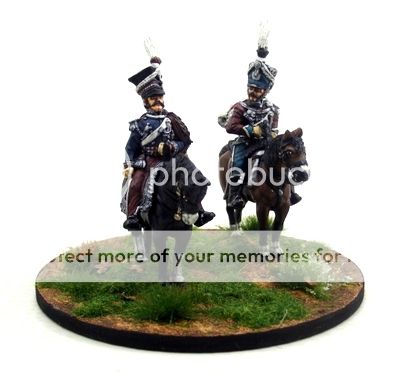 Prince Poniatowski, nephew to King Stanislaw II Augustus of Poland, was a dragoon colonel in the Austrian army. In 1789, he joined the reorganized Polish army as a major general in 1789. Defeated by the Russians1792, he was forced into exile.
Prince Poniatowski, nephew to King Stanislaw II Augustus of Poland, was a dragoon colonel in the Austrian army. In 1789, he joined the reorganized Polish army as a major general in 1789. Defeated by the Russians1792, he was forced into exile.
After Napoleon's victory at Jena and Auerstädt October 14, 1806, prince Poniatowski received a division command. He distinguished himself namely at Dantzig and Friedland, and was thus named Minister of War of the provisional government, and in 1808, commander-in-chief of the Grand Duchy of Warsaw created on July 22, 1807.
The prince got the Polish army back on its feet, therefore worrying Austria and Prussia. On the order of the Emperor, who removed Poniatowski's prestigious elements to form a regiment of Household cavalry for his Imperial Guard, part of the Polish army went to fight in Galicia.
Poniatowski withstood the Austrian attack on Warsaw (April 1809) and reconquered parts of former Poland by beating the Austrians at Gora and at Grochow. As a reward, Napoleon presented him with the grand-aigle de la Légion d'Honneur, a saber of honor and a lancer's shako. Poland, however, was still not rebuilt.
The prince remained faithful to Napoleon, and continued in his post as minister of War. He created engineering and artillery schools and organized the fortification of several garrisons. In April 1810, he was in Paris for the wedding of Napoleon and Marie-Louise.
In 1812, at the head of the 5th corps during the Russian campaign, he showed his worth at the Battle of the Moskowa. Poniatowski was the only foreigner to receive a marshal's baton from the hands of Napoleon October 16, 1813. But several days later, covering the retreat of Leipzig, he drowned in the Elster River
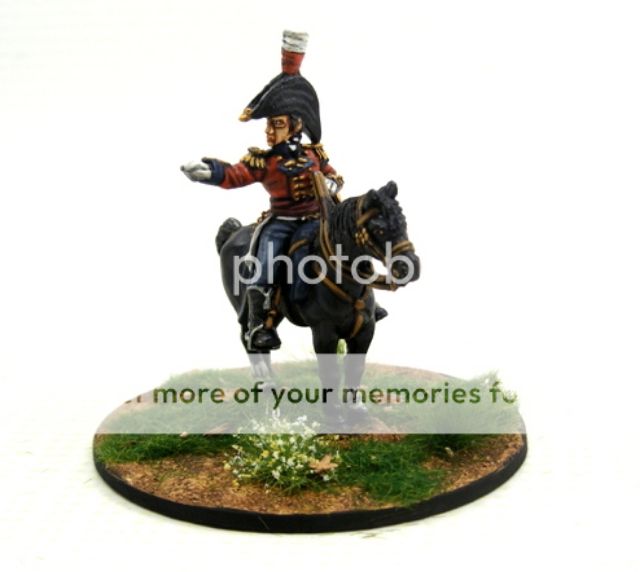 The Honourable Galbraith Lowry Cole entered the army in March 1787, and after serving as a junior officer was promoted to the rank of Major in 1793, when the struggle between Great Britain and France had commenced.
The Honourable Galbraith Lowry Cole entered the army in March 1787, and after serving as a junior officer was promoted to the rank of Major in 1793, when the struggle between Great Britain and France had commenced.
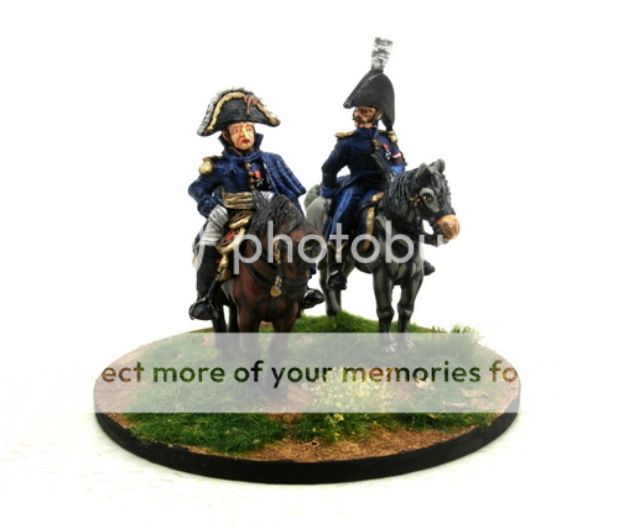 Soult, the eldest son, was destined to take over his father's law practice but preferred to enlist in the Royal Army at age 14. He used his first pay to prevent the family furniture from being seized. After two years of service, he left the military, tried his hand at baking, but re-enlisted rapidly.
Soult, the eldest son, was destined to take over his father's law practice but preferred to enlist in the Royal Army at age 14. He used his first pay to prevent the family furniture from being seized. After two years of service, he left the military, tried his hand at baking, but re-enlisted rapidly.
 Prince Poniatowski, nephew to King Stanislaw II Augustus of Poland, was a dragoon colonel in the Austrian army. In 1789, he joined the reorganized Polish army as a major general in 1789. Defeated by the Russians1792, he was forced into exile.
Prince Poniatowski, nephew to King Stanislaw II Augustus of Poland, was a dragoon colonel in the Austrian army. In 1789, he joined the reorganized Polish army as a major general in 1789. Defeated by the Russians1792, he was forced into exile.After Napoleon's victory at Jena and Auerstädt October 14, 1806, prince Poniatowski received a division command. He distinguished himself namely at Dantzig and Friedland, and was thus named Minister of War of the provisional government, and in 1808, commander-in-chief of the Grand Duchy of Warsaw created on July 22, 1807.
The prince got the Polish army back on its feet, therefore worrying Austria and Prussia. On the order of the Emperor, who removed Poniatowski's prestigious elements to form a regiment of Household cavalry for his Imperial Guard, part of the Polish army went to fight in Galicia.
Poniatowski withstood the Austrian attack on Warsaw (April 1809) and reconquered parts of former Poland by beating the Austrians at Gora and at Grochow. As a reward, Napoleon presented him with the grand-aigle de la Légion d'Honneur, a saber of honor and a lancer's shako. Poland, however, was still not rebuilt.
The prince remained faithful to Napoleon, and continued in his post as minister of War. He created engineering and artillery schools and organized the fortification of several garrisons. In April 1810, he was in Paris for the wedding of Napoleon and Marie-Louise.
In 1812, at the head of the 5th corps during the Russian campaign, he showed his worth at the Battle of the Moskowa. Poniatowski was the only foreigner to receive a marshal's baton from the hands of Napoleon October 16, 1813. But several days later, covering the retreat of Leipzig, he drowned in the Elster River
General Sir Lowry Cole 1772-1842
 The Honourable Galbraith Lowry Cole entered the army in March 1787, and after serving as a junior officer was promoted to the rank of Major in 1793, when the struggle between Great Britain and France had commenced.
The Honourable Galbraith Lowry Cole entered the army in March 1787, and after serving as a junior officer was promoted to the rank of Major in 1793, when the struggle between Great Britain and France had commenced.
In 1794 he was promoted Lieutenant Colonel in Ward’s Regiment, afterwards disbanded; and in 1799 he was promoted Lieutenant Colonel in General Villette’s Corps which also afterwards disbanded. In 1801, he was promoted Colonel. He served in the island of Sicily as Brigadier General, and commanded the 1st Brigade at the Battle of Maida on the 4th July 1806.
Major General Sir John Stuart, afterwards Count of Maida, bore testimony, in his public despatch, to
the gallant conduct of Brigadier General The Hon G L Cole on that occasion.
the gallant conduct of Brigadier General The Hon G L Cole on that occasion.
In 1808 he was promoted to the rank of Major General. His services were afterwards extended to the Peninsula, where he commanded a Division during the campaigns from 1810 to the overthrow of Napoleon, Emperor of France, and the restoration of the Bourbon dynasty in 1814.
For his distinguished services in the Peninsular Campaign he was Mentioned in the Despatches of the Duke of Wellington. He received the local rank of Lieutenant General for his service in Spain and Portugal.
He was appointed Colonel of the 103rd Regiment in 1812 and obtained the rank of Lieutenant General in 1813. He was nominated a Knight of the most Honourable Military Order of the Bath, and on the extension of that order, in 1815, he received the decorations of Knight Grand Cross of the Bath. In commemoration of his distinguished services in Sicily, Portugal, Spain, and the South of France, he received the distinction of a Cross and four clasps, for the battles of Maida, Albuhera, Salamanca, Vittoria, Pyrenees, Nivelle, Orthes and Toulouse.
In 1814 he was removed to the 70th Regiment as Colonel. In 1816 to the 34th, and in 1826 to the 27th Regiment. He was appointed Governor of Gravesend and Tilbury Fort and in 1830 promoted to the rank of General.
Marshal Jean Soult 1769-1851
 Soult, the eldest son, was destined to take over his father's law practice but preferred to enlist in the Royal Army at age 14. He used his first pay to prevent the family furniture from being seized. After two years of service, he left the military, tried his hand at baking, but re-enlisted rapidly.
Soult, the eldest son, was destined to take over his father's law practice but preferred to enlist in the Royal Army at age 14. He used his first pay to prevent the family furniture from being seized. After two years of service, he left the military, tried his hand at baking, but re-enlisted rapidly.
In 1789, he adopted Revolutionary ideas and worked his way up the military ladder. In 1794, at age 25, he was noticed at the Battle of Fleurus and named brigadier general. Two years later, he distinguished himself at the Battle of Altenkirchen 1796.
In September 1799, now division general of the Army of Helvetia, he took part in the victory at Zurich under Masséna's orders. He followed his commander to the Army of Italy and participated in the defense of Genoa, while Bonaparte was crossing the Great Saint Bernard Pass.
In late 1800, the First Consul sent him to pacify Piedmont. In 1802, Soult became colonel-general of the Consular Guard light infantry and a fervent Bonapartist. The advent of the Empire 1804 brought him titles and glory. He was named marshal on May 19 and grand-officer of the Légion d'Honneur.
As commander of the Saint-Omer camp in Boulogne, Soult trained the 4th corps of the Grande Armée, imposing strict discipline on his men. His reputation of being a merciless leader began here, and he was nicknamed "Iron" by his soldiers.
His army corps played an essential role at the Battle of Austerlitz 1805, seizing the Pratzen Plain. Napoleon complimented him on his action, calling him "the finest tactician in Europe." Soult then participated in the Prussian and Polish campaigns, namely distinguishing himself at Jena 1806 and at Eylau 1807. On June 16, 1807, he captured the town of Königsberg.
In 1808, he accompanied Napoleon to Spain. Created Duc de Dalmatie, he commanded the 2nd corps of the Grande Armée. First victorious, he advanced to Portugal. He imposed order there and let it be rumored that he could be the next King of Portugal. Wellington dashed his hopes when he defeated him at Oporto. The French marshal got his revenge at Ocaña in1809.
Major general under Joseph, restored to the Spanish throne, Soult managed to subdue Andalusia in 1810 and became governor of the province. In 1812, he was forced to retreat by Wellington's victorious troops.
In 1813, after a short stay in Germany, he was again sent to Spain to fight Wellington. He was unable to halt the English general, whose forces outnumbered his four to one, and had to cross the Pyrenees. Beaten at Orthez on February 27, 1814, he resisted fiercely, slowing down Wellington's advance by every means. In April, he maintained a siege at Toulouse 25,00 men against 100,000 enemy forces until the news of the Emperor's abdication.
Under Louis XVIII, Soult became War Minister. Napoleon, back from Elba, forgave him for his anti-Bonapartist declarations Soult had called him a "usurper" and an "adventurer" and named him major general of his army. Though he was not as efficient as Berthier, he nonetheless fought courageously at Waterloo, on June 15-18, 1815.
After the defeat, Soult retired to his Soulberg château, amidst his fine collection of paintings by Spanish masters, the result of his looting. His protests had not made the king bend. He was pardoned in 1819 and had his titles restored the following year.
Peer of France under Charles X, he played his most important political role under Louis Philippe, as War Minister and then president of the Council. In April 1838, he was France's ambassador to the coronation of Queen Victoria in England. This was the prelude to a career as Minister of Foreign Affairs, quickly interrupted by the arrival in power of Thiers, his rival. In 1847, the old marshal retired permanently, with the glorious title of Marshal general.
General Barclay De Tolly 1761-1818
A Livonian of Scottish descent, who joined the Russian army in 1776 as an ordinary soldier. He came to the attention of Prince Repnin in the war against the Turks in 1790, and he later also served in the Russo-Swedish war of 1788-90 and against the Poles. During the Winter campaign in Poland, 1806-07, Barclay de Tolly distinguished himself at the battles of Pultusk and Eylau, where he was seriously wounded as well. His bravery at Eylau earned him the respect of the Czar. He was promoted to Lieutenant General.
In Finland in 1808 Barclay de Tolly commanded the corps of 7.000 troops in the east that fought against general Johan August Sandels with his Savolax Brigade. In september of that year, Sandels was finally forced to retreat and the Swedish armies retreated from Finland as a whole. In March of 1809, Barclay de Tolly led his troops over the ice to mainland Sweden and landed at Umeå. This was a daring operation, that ended with the Russian troops marching back to Finland though. The coup d'etat where king Gustav IV Adolf had been deposed had been conducted in Stockholm at this time and a peace treaty seemed near.
In 1810 Barclay de Tolly was appointed Minister of War, succeeding the incompetent Alexei Arakchev, and also became the commander of the First Army of the West in 1812. This double-appointment proved difficult for him. Nonetheless, as Minister of War, Barclay de Tolly introduced many reforms that modernized the Russian army.
When Napoleon invaded Russia in 1812, Barclay de Tolly retreated further east with his First Army of the West, eventually linking up with the Second Army under Bagration at Smolensk. Here a major battle was fought, which the Russians lost mainly because of the mutual dislike between Barclay and Bagration. The new commander of the Russian army, Kutuzov, turned to fight the invading French. At Borodino on September 7 Barclay de Tolly commanded the right wing and there fought with skill. He resigned his command right after the battle though.
The next year he returned to service and commanded the Russian armies that went into Silesia to join with the Prussians. In 1813 and 1814 Barclay de Tolly accompanied the Czar in the campaigns against the French. He thereby took part in some of the greatest battles, Leipzig for instance. When Napoleon was finally beaten, Barclay de Tolly was made commander of the Russian forces occupying France. By 1815 he was made commander of the Russian army that was sent to fight Napoleon as he had returned from Elba. Waterloo ended the campaign before Barclay de Tolly reached France though. By then he was already Prince and field Marshal.
Marshal Michel Ney 1769-1815
Michel Ney, 1st Duke d'Elchingen, 1st Prince of Moscow, popularly known as Marshal Ney, was a French soldier and military commander during the French Revolutionary Wars and the Napoleonic Wars. He was one of the original 18 Marshals of France created by Napoleon. He was known as Red faced by his men and nicknamed the bravest of the brave by Napoleon.
General Desnouettes1773-1822
General Charles Lefebvre-Desnouettes was one of the most loyal of Napoleon's officers. He was a highly skilled horseman and a gifted commander. Born of bourgeois parents Jean-Claude Lefebvre and his wife Mlle A Leduc, in the Pont Neuf district of Paris where his father ran a drapery business and as such, was a supplier to the French army.
He was made ADC to Napoleon when he became Premier Consul. He was promoted to General-de-Brigade in 1806, and General-de-Division in December 1807, at the age of 34.
There was just one stain on an otherwise unblemished career. This occurred at Benevente in Spain on the morning of the 29th December 1808. Lefebvre took a detachment of his Chasseurs-a-Cheval de la Garde Imperial (some 500 officers and men) across the river Esla unaware that there was a substantial body of enemy cavalry still present in the town. The error was entirely of his own making and moreover elementary to an officer of his standing, experience, and ability. He ought to have had scouts well ahead of his force to foresee and avoid just that eventuality. Having reached the opposite bank, the French were first attacked by a regiment of English light dragoons. The General, who lost his sabre in the river during the action, was wounded and taken prisoner by a German dragoon named Bergman who is stated to have then given up his prize to a trooper Grisdale of the 10th Hussars. Approximately 60 of Lefebvre's men were also captured by the 10th Hussars who were commanded by General Henry William Paget. Other French officer casualties included Lieutenant Bocheux who was killed and Capitaines Geist and Cayre who were among the wounded.
The General was paroled at Cheltenham and in due course was joined by his wife Stephanie who had been granted a passport by the Emperor following a suggestion by General Lejeune who himself had only recently made good his escape from Ashby de la Zouch.. The General and Stephanie became extremely popular locally and their attendance at social events was a matter of great demand. Some years earlier, the Emperor had given the Lefebvre a signet ring of great value. The ethos of parole was trust and when in late 1811, Lefebvre, using the ring as a bribe, broke his parole and escaped back to France, the English public, especially those in Cheltenham were outraged, and all manner of inaccurate stories ensued. However, the escape was made good, much to the delight of the French military high command and the General took his rightful position at the head of his Chasseurs-a-Cheval in time for the disastrous Russian Campaign of 1812. I wonder if there was any time that he wished that he had remained a prisoner in Cheltenham.
After the defeat of Waterloo, Lefebvre and his three principal accomplices were proscribed by the subsequent Ordnance and fled to the United States. Lefebvre lived there until 1821 when his wife had managed to secure permission for him to return to Amsterdam and there await the final invitation to re-enter France. At the end of April 1821 he took passage in a ship called the "Albion", a vessel belonging to the "Black Ball" line, which, on approaching the coast of southern Ireland encountered very severe weather and sank just off Kinsale. Lefebvre was among those who lost their lives.
Sadly, he did not get to see his only daughter, Charlotte-Lavinie, who must have been conceived just prior to Waterloo. Charlotte was later the recipient of a large inheritance of 100,000 francs from the Emperor's estate.
Lefebvre was a fine soldier and a commander of the highest order. The only two blemishes on an otherwise remarkable and loyal career were the circumstances of his capture at Benevente, and his escape from Cheltenham, which, to the English anyway, destroyed his honour.
General Jean-Joseph Ange d'Hautpoul 1754-1808
 Another fine commander and a heavy cavalry specialist, mainly cuirassiers. He came from a very old noble family, which had a tradition of serving France stretching back hundreds of years. Talented and charismatic, a giant of a man, with enormous upper body strength, and who used his physical presence to great effect. A veteran soldier when compared with many of the Emperor's senior commanders.
Another fine commander and a heavy cavalry specialist, mainly cuirassiers. He came from a very old noble family, which had a tradition of serving France stretching back hundreds of years. Talented and charismatic, a giant of a man, with enormous upper body strength, and who used his physical presence to great effect. A veteran soldier when compared with many of the Emperor's senior commanders. Present on the fields of Maubeuge, Fleurus, Blankenberg, Altenkirchen, Neuwied, Ostrach, Stockach, Engen, Biberach, and Hohenlinden. He had an awesome reputation even before Napoleon came on the scene.
He was at Austerlitz, where he led the charge against the Russian centre on the Pratzen Heights with his 2nd Heavy Cavalry Division comprising the 1er, 5e, 10e and 11e Cuirassier Regiments with his brigade commander, the 44 year old General Raymond-Gaspard de Bonardi Saint Sulpice.
Then at Jena on 14 October 1806, where d'Hautpoul retained divisional command, the 1er and 5e Cuirassiers were under Brigade commander General Jean-Christophe Collin Verdiere of which only the four squadrons of the 1er Cuirassiers were engaged, while Saint-Sulpice retained command of the 2e brigade. Four days later, on 18 October, at Schwarzbourg in Germany, Verdiere suddenly died aged 52.
At Eylau on 7 February 1807, d'Hautpoul led his division in action against the Russians, his squadrons together with those of Colonel Lepic of the Grenadiers-a-Cheval having penetrated to the third line of the enemy, and causing many casualties. d'Hautpoul was struck by a canon ball, which shattered his hip. The renowned surgeon, Dominique Larrey, on viewing d'Hautpoul's terrible wounds recommended amputation of his leg as his only chance of survival, but encouraged by Pierre-Francois Percy, the stricken cavalry commander unwisely ignored this advice. He was taken wrapped in his bloodstained cloak to the nearby village of Vornen where he died the following day. He was 51 years of age.
According to Meneval's Memoirs, Volume 2, d'Hautpoul in spite of his wounds, wrote to Napoleon expressing his everlasting devotion. The Emperor for his part, replied stating that he was sure d'Hautpoul would survive to lead his squadrons in further victorious actions.
The gallant cavalryman's command was taken over by his long time friend and colleague General Saint-Sulpice.
d'Hautpoul was a very talented soldier and one of the great commanders of his time. His loss was a great blow to Napoleon, however, the giant cuirassier probably died as he would have wished, leading his men in action across the snowy wastes of Eylau.
General Pierre David de Colbert-Chabanais1774-1853
 Born into a noble family descended from the prestigious Colbert line, he was the son of the comte de Colbert, a rich landowner. On 23 August 1793, Pierre followed the traditional family route into the army, which was now the Republican army, although he was suspicious of the French Revolution. He fought in the 1793 campaigns in the armée du Rhin, as a member of the bataillon de Paris, also known as the bataillon Guillaume-Tell after William Tell. He moved to the 11th Hussar Regiment, gaining promotion to maréchal-des-logis in September 1793 and to sous-lieutenant the following month.
Born into a noble family descended from the prestigious Colbert line, he was the son of the comte de Colbert, a rich landowner. On 23 August 1793, Pierre followed the traditional family route into the army, which was now the Republican army, although he was suspicious of the French Revolution. He fought in the 1793 campaigns in the armée du Rhin, as a member of the bataillon de Paris, also known as the bataillon Guillaume-Tell after William Tell. He moved to the 11th Hussar Regiment, gaining promotion to maréchal-des-logis in September 1793 and to sous-lieutenant the following month.After three years in the armée du Rhin and in the armies suppressing the Vendean Revolt, he was dismissed by Lazare Hoche in 1796. He left the 7th Hussars to become a commissaire des guerres to the armée d'Orient, with the job of guaranteeing Bonaparte's supply lines to Egypt. During that time Bonaparte took him under his wing.
Returning to the army after Egypt, he was wounded and made a captain in the 3rd Dragoon Regiment, before finally rising to become aide de camp to Damas. He then became adjudant-major to the Mameluks and aide de camp to Junot in 1803. He then followed Junot to become part of the armée des côtes.
Colbert left Junot in 1805 and followed major général Maréchal Berthier as his aide de camp. He assisted at Austerlitz, where he was wounded and made a chef d'escadron. He fought bravely at Iena and Pułtusk. In 1807 he was made a colonel and head of his old regiment, the 7th Hussars. This unit was now part of Lassalle's brigade, nicknamed the "infernal" brigade due to its passion. Napoleon made him a knight of the Légion d'honneur in 1808 and baron de Chabanais et de l'Empire in 1809
Colbert was promoted to général de brigade on 9 March 1809 and put under the orders of Oudinot. He won glory at the Battle of Raab by charging and defeating Ott's hussars, cutting several squadrons of the enemy Hungarian cavalry to pieces and nearly coming to the aid of the 9th Hussar Regiment, which the Austrians were on the point of overwhelming. At Wagram Colbert was shot in the head three times and was made a commander of the Légion d'honneur.
Attached to the Imperial Guard in 1811, he re-formed and commanded the 2e régiment de chevau-légers lanciers de la Garde impériale (better known as the Red Lancers, they were also nicknamed the écrevisses or crayfish, after their red uniforms). He also led the brigade for the whole of the Russian campaign under the orders of the duc d'Istrie. He and the Lancers then bravely covered the Grande Armée's retreat. He was made a général de brigade in 1813 during the retreat back through Germany and at Bautzen he broke and routed the Russians and cut them to pieces. On 25 November 1813 he was promoted to général de division.
General Friedrich Wilhelm von Bülow 1755-1816
 Bülow was born in Falkenberg (Wische) in the Altmark and was the elder brother of Freiherr Dietrich Heinrich von Bülow. He received an excellent education, and entered the Prussian army in 1768, becoming ensign in 1772, and second lieutenant in 1775. He took part in the Potato War of 1778, and subsequently devoted himself to the study of his profession and of the sciences and arts.
Bülow was born in Falkenberg (Wische) in the Altmark and was the elder brother of Freiherr Dietrich Heinrich von Bülow. He received an excellent education, and entered the Prussian army in 1768, becoming ensign in 1772, and second lieutenant in 1775. He took part in the Potato War of 1778, and subsequently devoted himself to the study of his profession and of the sciences and arts.
Throughout his life Bülow was devoted to music, his great musical ability bringing him to the notice of King Frederick William II of Prussia, and ca. 1790 he was conspicuous in the most fashionable circles of Berlin. He did not, however, neglect his military studies, and in 1792 he was made military instructor to the young Prince Louis Ferdinand of Prussia, becoming at the same time full captain. He took part in the campaigns of 1792-94 on the Rhine, and received for signal courage during the siege of Mainz the order Pour le Mérite and promotion to the rank of major.
After this Bülow went to garrison duty at Soldau. In 1802 he married the daughter of Colonel von Auer, and in the following year he became lieutenant-colonel, remaining at Soldau with his corps. The vagaries and misfortunes of his brother Dietrich affected his happiness as well as his fortune. The loss of two of his children was followed in 1806 by the death of his wife, and a further source of disappointment was the exclusion of his regiment from the field army sent against Napoleon in 1806. The disasters of the campaign aroused his energies. He did excellent service under Anton Wilhelm von L'Estocq's command in the latter part of the war, was wounded in action, and finally designated for a brigade command in Field Marshal Gebhard Leberecht von Blücher's force.
In 1808 Bülow married the sister of his first wife, a girl of eighteen. He was made a major-general in the same year, and henceforward he devoted himself wholly to the regeneration of Prussia. The intensity of his patriotism threw him into conflict even with Blücher and led to his temporary retirement; in 1811, however, he was again employed.
In the short peace of 1814-1815 Bülow was at Königsberg as commander-in-chief in Prussia proper. He was soon called to the field again, and in the Waterloo campaign commanded the IV Corps of Blücher's army. He was not present at Ligny, but his corps headed the flank attack upon Napoleon at the Battle of Waterloo, and bore the heaviest part in the fighting of the Prussian troops around Plancenoit. He took part in the invasion of France, but died suddenly on 25 February 1816, a month after his return to the Königsberg command.


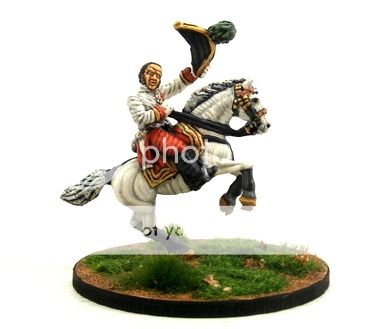
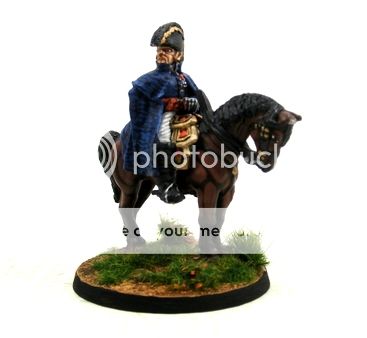

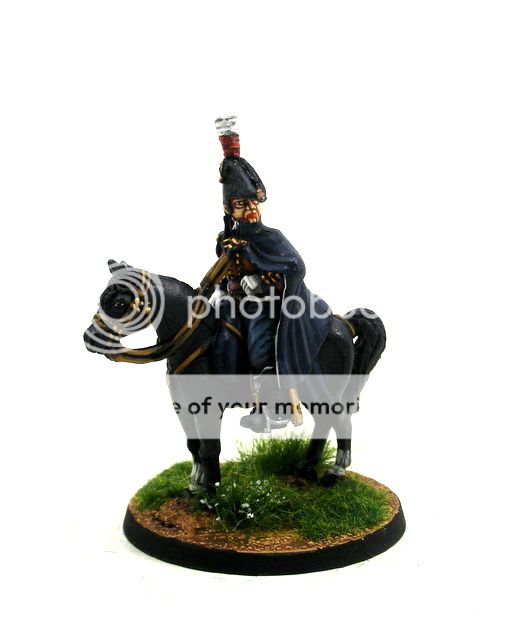

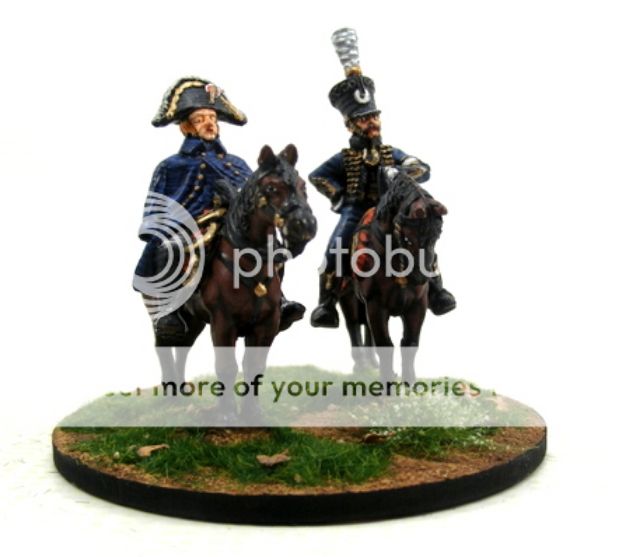
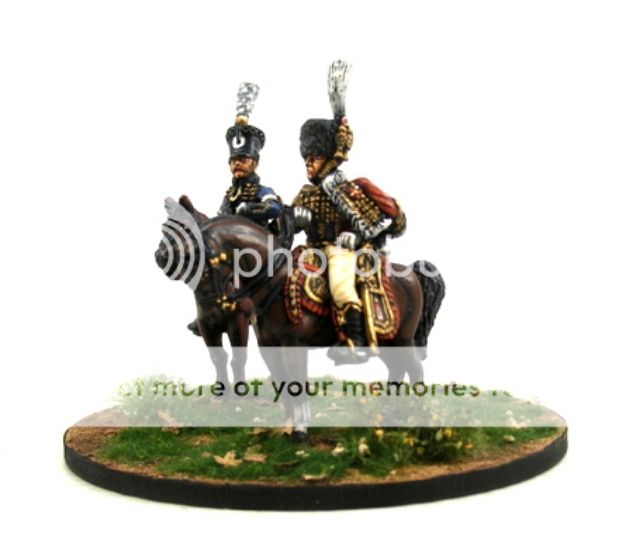
No comments:
Post a Comment